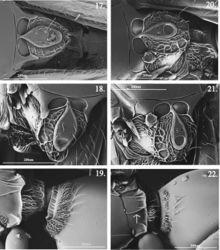Leptopilina heterotoma
| Notice: | This page is derived from the original publication listed below, whose author(s) should always be credited. Further contributors may edit and improve the content of this page and, consequently, need to be credited as well (see page history). Any assessment of factual correctness requires a careful review of the original article as well as of subsequent contributions.
If you are uncertain whether your planned contribution is correct or not, we suggest that you use the associated discussion page instead of editing the page directly. This page should be cited as follows (rationale):
Citation formats to copy and paste
BibTeX: @article{Lue2016JournalofHymenopteraResearch, RIS/ Endnote: TY - JOUR Wikipedia/ Citizendium: <ref name="Lue2016Journal of Hymenoptera Research">{{Citation See also the citation download page at the journal. |
Ordo: Hymenoptera
Familia: Figitidae
Genus: Leptopilina
Name
Leptopilina heterotoma (Thomson, 1862) – Wikispecies link – Pensoft Profile
- Eucoila heterotoma Thomson, 1862: 403 (original description); Nordlander, 1978: 50 (lectotype designation).
- Ganaspis subnuda Kieffer, 1904: 64 (original description); Forshage, Nordlander & Buffington, 2013: 233 (junior synonym of Leptopilina heterotoma (Thomson), type information).
- Ganaspis monilicornis Kieffer, 1905: 623 (original description); Weld, 1952: 228 (junior synonym of Ganaspis musti).
- Erisphagia philippinensis Kieffer, 1916: 282 (original description).
- Pseudeucoila (Pseudeucoila) bochei Weld, 1944: 65-66 (original description).
- Cothonaspis (Erisphagia) philippinensis (Kieffer): Weld, 1952: 244 (generic transfer).
- Pseudeucoila bochei Weld: Nøstvik, 1954: 142 (description of early developmental stages); Forshage, Nordlander & Buffington, 2013: 233 (junior synonym of Leptopilina heterotoma (Thomson), type information).
- Leptopilina monilicornis (Kieffer): Nordlander, 1980: 430 (removed from synonymy with Ganaspis musti and entered into synonymy with Leptopilina heterotoma).
- Leptopilina philippinensis (Kieffer): Nordlander, 1980: 430 (junior synonym of Leptopilina heterotoma, lectotype designation).
- Leptopilina subnuda (Kieffer): Nordlander, 1980: 430 (junior synonym of Leptopilina heterotoma).
- Leptopilina bochei (Weld): Nordlander, 1980: 431 (junior synonym of Leptopilina heterotoma).
- Leptopilina heterotoma (Thomson): Nordlander, 1980: 430 (generic transfer); Paretas-Martínez, Forshage, Buffington, Fisher, La Salle & Pujade-Villar, 2013: 80 (new distribution record for Australia, listed); Forshage, Nordlander & Buffington, 2013: 233 (cataloged, type information, synonymy); Ward, 2014: 575 (keyed); van Noort, Buffington & Forshage, 2015: 92 (listed).
Diagnosis
Leptopilina heterotoma (Figs 40–41) is immediately distinguishable from other Leptopilina by their large and rhombus shaped scutellar plate (Fig. 17); other species have a smaller scutellar plate that is shaped like a tear drop (Fig. 20), and exposing at least half of the scutellum (in dorsal view).
Redescription
Coloration with head, mesosoma, metasoma black to dark brown, legs light brown. Malar sulcus present. Apical segment of maxillary palp 1–1.5 times as long as preceding segment. Terminal flagellomere with two basiconic sensillae. Basiconic sensillae present on F6–F11. Placoidal sensilla present on F6–F11. Number of ridges on pronotal plate in lateral view 3. Sculpture on mesoscutum absent, entire surface smooth, shiny. Parascutal carina curved mesally. Dorsal surface of scutellum areolet - rugulose. Circumscutellar carina present, incomplete, laterally delimiting dorsal and ventral halves of scutellum, not present posteriorly. Latero-ventral margin of scutellum posterior to axillula smooth ventrally, weakly rugulose dorsally. Dorsal part of scutellum entirely rugose. Scutellar plate, in dorsal view, large, rhombus shape, covering most of scutellum. Posterior impression of metepimeron absent. Anterior impression of metepisternum, immediately beneath anterior end of metapleural carina, present, small and narrow. Wing vein M absent. Inter propodeal carinae space setose, too dense to see underlying surface. Horizontal carina running anteriorly from lateral propodeal carina not visible, setae too dense. Surface of petiole longitudinally costate laterally, shagreen dorsally. Setal band (hairy ring) at base of tergum 3 present, interrupted dorsally, ventrally, dense hair.
Distribution in Eastern North America
Maryland and Virginia. [http://hol.osu.edu/map-full.html?id=323709]
Material examined
United States. MD, Baltimore Co., 39.668081°N 76.578860°W, White Hall Site, 17.VI.2012, bait trap, C.-H. Lue (5 females, USNMENT00917851, 00917918, 00917956, 00917980, 00917998 (USNM)). MD, Baltimore Co., 39.668081°N 76.578860°W, White Hall Site, 19.VI.2012, bait trap, C.-H. Lue (1 female, USNMENT00917991 (USNM)). MD, Baltimore Co., 39.668081°N 76.578860°W, White Hall Site, 19.VI.2012, yellow pan trap, C.-H. Lue (2 females, USNMENT01022188, 01022240 (USNM)). MD, Baltimore Co., 39.668081°N 76.578860°W, White Hall Site, 20.VI-23.VI.2012, bait trap, C.-H. Lue (3 females, USNMENT00917909-00917910, 00917941 (USNM)). VA, Arlington Co., Maywood, 20.XI.1921, W. L. McAtee (4 females, USNMENT01197507, 01197511, 01197525, 01197536 (USNM)).
Taxon Treatment
- Lue, C; Driskell, A; Leips, J; Buffington, M; 2016: Review of the genus Leptopilina (Hymenoptera, Cynipoidea, Figitidae, Eucoilinae) from the Eastern United States, including three newly described species Journal of Hymenoptera Research, (53): 35-76. doi
Images
|

